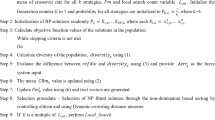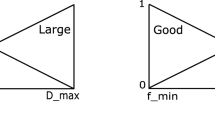Abstract
More and more multi-objective evolutionary algorithms are proposed and used to solve many-objective optimization problems and large-scale optimization problems. However, most of the existing algorithms use fixed crossover probability (pc) and mutation probability (pm) in the generation process of offspring, which makes the performance of the algorithm poor when dealing with complex problems. In this paper, by analyzing the complex non-linear relationship between performance metrics and pc and pm in the search process of many-objective evolutionary algorithms. A fuzzy inference system is constructed to dynamically update the pc and pm in the iterative process. Therefore, a fuzzy adaptive NSGA-III algorithm is proposed and used to solve large-scale optimization problems. For the construction of fuzzy systems, this paper takes the number of iterations, convergence metric, and diversity metric as inputs, and pc and pm as outputs. Four different fuzzy systems are obtained, and the best fuzzy system is selected through experiments. In order to further verify the effectiveness of the algorithm, the proposed algorithm and the existing literature are tested on LSMOP problems. The results show that the fuzzy system can well describe the complex non-linear relationship between the performance metrics and the pc and the pm in the search process of the many-objective evolutionary algorithm. It also effectively improves the performance of the algorithm when solving large-scale optimization problems, resulting in maintenance of the convergence and diversity of the population.





Similar content being viewed by others
Explore related subjects
Discover the latest articles and news from researchers in related subjects, suggested using machine learning.References
Gu, F., Kapelan, Z., Kasprzyk, J.R.: Optimal design of water distribution systems using many-objective visual analytics. J. Water Resour. Plan. Manag. 139(6), 624–633 (2012)
Zhang, Y., Song, X.F., Gong, D.W.: A return-cost-based binary firefly algorithm for feature selection. Inf. Sci. 418–419, 561–574 (2017)
Mao, W., He, J., Tang, J.: Predicting remaining useful life of rolling bearings based on deep feature representation and long short-term memory neural network. Adv. Mech. Eng. 10(12), 1–18 (2018)
Herrero, J.G., Berlanga, A., López, J.M.: Effective evolutionary algorithms for many-specifications attainment: application to air traffic control tracking filters. IEEE Trans. Evol. Comput. 13(1), 151–168 (2008)
Deb, K., Pratap, A., Agarwal, S.: A fast and elitist multiobjective genetic algorithm: NSGA-II. IEEE Trans. Evol. Comput. 6(2), 182–197 (2002)
Coello, C.A.C., Pulido, G.T., Lechuga, M.S.: Handling multiple objectives with particle swarm optimization. IEEE Trans. Evol. Comput. 8(3), 256–279 (2004)
Bader, J., Zitzler, E.: HypE: an algorithm for fast hypervolume-based many-objective optimization. Evol. Comput. 19(1), 45–76 (2011)
Asafuddoula, M., Ray, T., Sarker, R.: A decomposition-based evolutionary algorithm for many objective optimization. IEEE Trans. Evol. Comput. 19(3), 445–460 (2015)
Zhang, Q.F., Li, H.: MOEA/D: a multiobjective evolutionary algorithm based on decomposition. IEEE Trans. Evol. Comput. 11(6), 712–731 (2007)
Wang, L., Zhang, Q.F.: Constrained subproblems in decomposition based multiobjective evolutionary algorithm. IEEE Trans. Evol. Comput. 20(3), 475–480 (2016)
Gu, F., Liu, H.L., Cheung, Y.M.: Optimal WCDMA network planning by multiobjective evolutionary algorithm with problem-specific genetic operation. Knowl. Inf. Syst. 45(3), 679–703 (2015)
Deb, K., Jain, H.: An evolutionary many-objective optimization algorithm using reference-point-based nondominated sorting approach, Part I: solving problems with box constraints. IEEE Trans. Evol. Comput. 18(4), 577–601 (2014)
Farina, M., Amato, P.: On the optimal solution definition for many-criteria optimization problems. In: NAFIPS Meeting of the North American Fuzzy Information Processing Society, pp. 233–238. IEEE (2002)
Komodakis, N., Pesquet, J.C.: Playing with duality: an overview of recent primal–dual approaches for solving large-scale optimization problems. IEEE Signal Process. Mag. 32(6), 31–54 (2015)
Li, Z., Lin, K., Nouioua, M., Jiang, S.: A decomposition based evolutionary algorithm with angle penalty selection strategy for many-objective optimization. In: Tan, Y., Shi, Y., Tang, Q. (eds) Advances in Swarm Intelligence. ICSI 2018. Lecture Notes in Computer Science, Springer, Cham. 10941 (2018)
Ma, X., Liu, F., Qi, Y.: A multiobjective evolutionary algorithm based on decision variable analyses for multiobjective optimization problems with large-scale variables. IEEE Trans. Evol. Comput. 20(2), 275–298 (2016)
Gu, Z., Wang, G.: Improving NSGA-III algorithms with information feedback models for large-scale many-objective optimization. Future Gener. Comput. Syst. 107, 49–69 (2020)
Yi, J.H., Deb, S., Dong, J.: An improved NSGA-III algorithm with adaptive mutation operator for Big Data optimization problems. Future Gener. Comput. Syst. 88, 571–585 (2018)
Silva, R.C., Yamakami, A.: The use of possibility theory in the definition of fuzzy Pareto-optimality. Fuzzy Optim. Decis. Mak. 10, 11–30 (2011)
Zou, F., Chen, D., Xu, Q.: A new prediction strategy combining T–S fuzzy nonlinear regression prediction and multi-step prediction for dynamic multi-objective optimization. Swarm Evol. Comput. 59, 100749–100768 (2020)
Rangel-González, J.A., Fraire, H.: Fuzzy multi-objective particle swarm optimization solving the three-objective portfolio optimization problem. Int. J. Fuzzy Syst. 22, 2760–2768 (2020)
Mellal, M.A., Salhi, A.: Multi-objective system design optimization via PPA and a fuzzy method. Int. J. Fuzzy Syst. 23(5), 12131221 (2021)
Santiago, A., Dorronsoro, B., Nebro, A.J.: A novel multi-objective evolutionary algorithm with fuzzy logic based adaptive selection of operators: FAME. Inf. Sci. 471, 233–251 (2019)
Santiago, A., Dorronsoro, B., Fraire, H.J.: Micro-genetic algorithm with fuzzy selection of operators for multi-Objective optimization: \(\mu\)FAME. Swarm Evol. Comput. 61(1), 100818 (2021)
Liu, S., Lin, Q., Tan, K.C.: A fuzzy decomposition based multi- and many-objective evolutionary algorithm. IEEE Trans. Cybern. (2020). https://doi.org/10.1109/TCYB.2020.3008697
Wang, H., Jin, Y., Yao, X.: Diversity assessment in many-objective optimization. IEEE Trans. Cybern. 47(6), 1510–1522 (2017)
Das, I., Dennis, J.E.: Normal-Boundary Intersection: a new method for generating the Pareto surface in nonlinear multicriteria optimization problems. SIAM J. Optim. 8(3), 631–657 (1996)
Roy, S.: Introduction to Soft Computing Neurofuzzy and Genetic Algorithms. Dorling Kindersley, New Delhi (2013)
Zhang, S.L., Xie, J.L.: Improved NSGA-III algorithm based on fuzzy system. Fuzzy Syst. Math. (In press) (In Chinese)
Wang, Y.N., Wu, L.H., Yuan, X.F.: Multi-objective self-adaptive differential evolution with elitist archive and crowding entropy-based diversity measure. Soft Comput. 14(3), 193–209 (2010)
Cheng, R., Jin, Y., Olhofer, M.: Test problems for large-scale multiobjective and many-objective optimization. IEEE Trans. Cybern. 47(12), 4108–4121 (2017)
Zhou, A., Zhang, Q., Jin, Y.: A model based evolutionary algorithm for bi-objective optimization. In: 2015 IEEE Congress on Evolutionary Computation, vol 3, pp. 2568–2575 (2005)
Cai, X., Xiao, Y., Li, M.: A grid-based inverted generational distance for multi/many-objective optimization. IEEE Trans. Evol. Comput. 25(1), 21–34 (2020)
Jain, H., Deb, K.: An evolutionary many-objective optimization algorithm using reference-point based nondominated sorting approach, Part II: handling constraints and extending to an adaptive approach. IEEE Trans. Evol. Comput. 18(4), 602–622 (2014)
Zhu, Q.L., Zhang, Q.F., Lin, Q.Z.: A constrained multiobjective evolutionary algorithm with detect-and-escape strategy. IEEE Trans. Evol. Comput. 24(5), 938–947 (2020)
Funding
This work was supported in part by the National Natural Science Foundation of China (Nos. 11371130, 12071179), Soft Science Research Program of Fujian Province (No. B19085), The Project of Education Department of Fujian Province (No. JT180263), The Youth Innovation Fund of Xiamen City (3-502Z20206020), The Open Fund of Key Laboratory of Applied Mathematics of Fujian Province University (Putian University) (No. SX201906) and Digital Fujian Big Data Modeling and Intelligent Computing Institute, Pre-Research Fund of Jimei University.
Author information
Authors and Affiliations
Contributions
SZ completed the experiment and the first draft and JX gave the overall framework of the paper and introduction. HW modified the grammar of the paper.
Corresponding author
Ethics declarations
Conflict of interest
All authors declare that they have no conflict of interest.
Rights and permissions
About this article
Cite this article
Zhang, S., Xie, J. & Wang, H. Fuzzy Adaptive NSGA-III for Large-Scale Optimization Problems. Int. J. Fuzzy Syst. 24, 1619–1633 (2022). https://doi.org/10.1007/s40815-021-01220-9
Received:
Revised:
Accepted:
Published:
Issue Date:
DOI: https://doi.org/10.1007/s40815-021-01220-9




